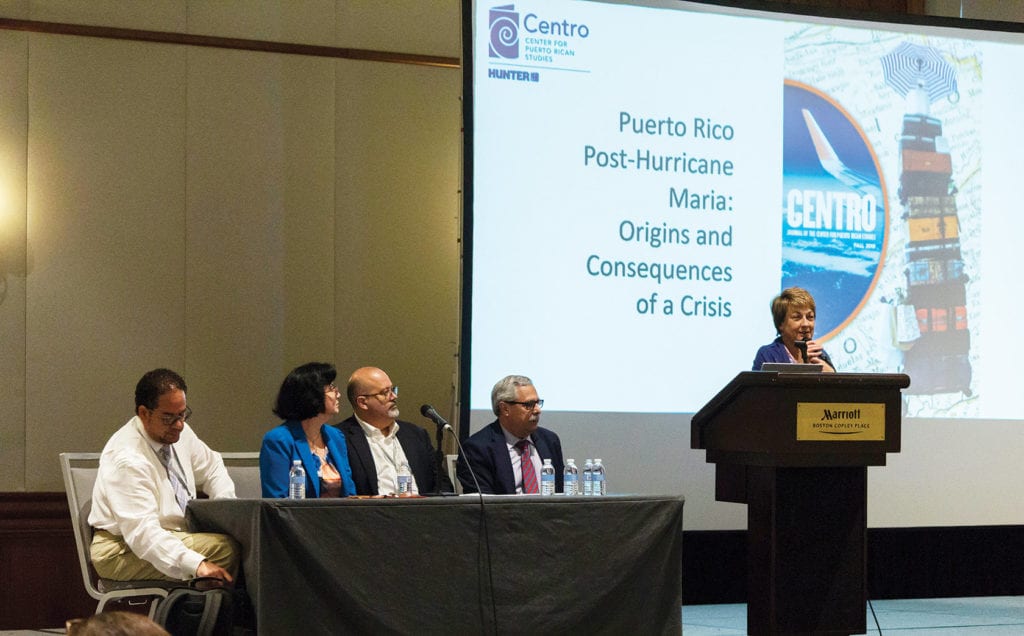
After Hurricane Maria hit Puerto Rico in September 2017, power grids, telecommunications networks, transportation systems and more were hurt or wiped out. Months later, basic resources had not been restored in some parts of the island.
Even now, Puerto Rico has not fully recovered from the storm.
In a May 27 panel at the Latin American Studies Association’s annual conference, held in Boston, experts discussed the impacts of Hurricane Maria on the island territory, and why it has taken so long for its infrastructure to recover.
“Puerto Rico is not going only through one crisis, it’s going through a series of overlapping crises, some of them longer-term than others,” said Hector Cordero-Guzman, professor at the Baruch College of the City University of New York, explaining that the crisis has social, economic, fiscal, political and even psychological dimensions. “And now on top of that, we have the impacts of Hurricane Maria.”
The panelists all agreed that Puerto Rico’s crisis did not start with the hurricane, but had been ongoing well before that. Charles Venator-Santiago, of the University of Connecticut, explained that ever since the United States took control of the island, it has not been able to decide what rights are afforded to its residents, with more than 100 bills dealing with different forms of citizenship for Puerto Ricans going through Congress in its history.
He explained that in 1922, the Supreme Court established that the island would remain a foreign territorial possession until Congress enacts legislation to incorporate it, something that has yet to happen.
“For more than a century, Congress … has neglected to enact legislation that incorporates Puerto Rico or addresses the doctrine of ‘separate but unequal’ that rules Puerto Rico,” Venator-Santiago said. “If Congress were to take a measure to declare that Puerto Ricans should be treated equally, or that Puerto Rico should be treated as a part of the United States, we could address a lot of these issues.”
Marie Mora, a professor at the University of Texas, Rio Grande Valley, said that Puerto Rico’s debt crisis reached a high point in 2006, and since then, the island has seen only one year of positive economic growth. This is due to a variety of reasons, including higher sales taxes than any of the 50 states, and has occurred alongside a shrinking and rapidly aging population.
As Puerto Ricans migrate from the island to the U.S. mainland, those left behind suffer depleted resources, an issue greatly exacerbated by the aftermath of the 2017 hurricane.
“The longer this crisis takes to address, the longer will be the cycle of debt, migration, demographic shift, economic decline and suffering,” Mora said.
Cordero-Guzman said that myths about Puerto Ricans abound on the U.S. mainland, portraying them as lazy and uneducated, and making it even less likely that the island receives the aid it needs. The problems faced there only make these misconceptions worse.
“It’s not like people are taking welfare, and then the labor market collapses,” he said. “It’s that the labor market collapses, and then people are participating in the program.”
Venator-Santiago said that it would not take much for Congress to decide to help the territory out of its slump, and that the groundwork for legislation to incorporate Puerto Rico has been laid for decades.
“This does not require a major ruling,” he said. “This just merely requires that U.S. lawmakers make a decision to treat Puerto Rico like a part of the United States, and that’s not complicated.”
The Latin American Studies Association is the largest such organization in the world for scholars studying the region. Its 2019 conference, which took place last weekend, was held at the Marriott Copley Place and Sheraton Boston Hotels last weekend.






